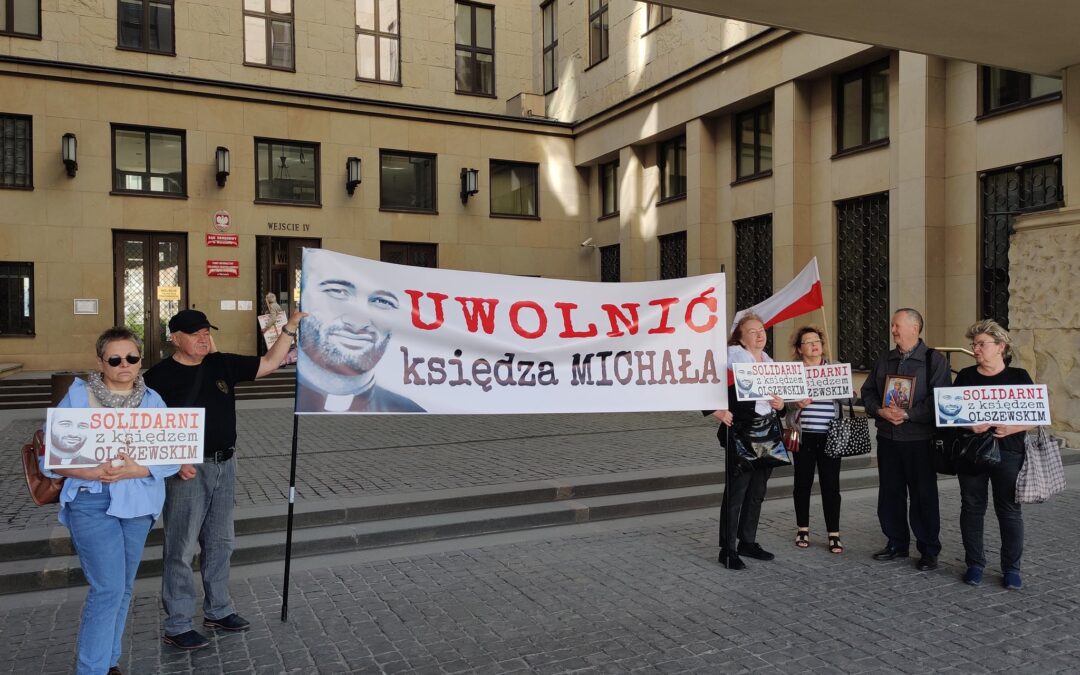
Poland’s interior minister has rejected claims by the opposition that a priest who was placed in pretrial detention earlier this year in relation to alleged corruption under the previous government was tortured.
The prison service has also appealed to politicians and media to stop “spreading false information”.
Opposition figures, however, insist that they believe claims of torture made by the priest, Michał Olszewski, and his lawyers.
They have called on international organisations, including the UN’s Committee against Torture and Amnesty International, to investigate.
Olszewski was detained in March as part of an investigation into alleged corruption in the disbursement of funds by the justice ministry under the former national-conservative Law and Justice (PiS) government. That same investigation has led prosecutors to seek charges against two former deputy justice ministers.
In Olszewski’s case, it is claimed that there were irregularities in the granting and spending of money his foundation received for building a centre to help victims of crime. Media have reported that Olszewski is a friend of Zbigniew Ziobro, who served as justice minister in the PiS government.
Shortly after Warsaw’s district court had approved an extension to Olszewski’s detention, Sieci, a conservative news weekly, published a letter in which the priest alleged mistreatment at the hands of the prison authorities.
He claimed to have been kept in “the hole” for his first two weeks in prison, where throughout the whole day he was kept in handcuffs and at night lights were left on in his cell.
Olszewski also said that when he was first placed in the cell he was denied food and water. “I begged for half a bottle of tap water,” said the priest, who then claimed he was told by guards to use the same bottle to go to the toilet in.
Shortly after the letter was published, one of the priest’s lawyers
confirmed that it was genuine and said Olszewski had received nothing to
eat during his first 60 hours in prison. Another lawyer said Olszewski
had lost 15kg (33lbs) of weight so far during his imprisonment.
In response to the claims, Poland’s human rights commissioner, Marcin Wiącek, announced that his office had launched an investigation.
Meanwhile, politicians from Ziobro’s Sovereign Poland (Suwerenna Polska) party, which is allied with PiS, announced that they would submit applications to the UN’s Committee against Torture, Amnesty International and the Helsinki Foundation for Human Rights to investigate the case.
PiS leader Jarosław Kaczyński accused the authorities of using “methods of torture from the Tsarist era”, referring to violent repression when part of Poland was under Russian rule.
He said the government was seeking to “intimidate and terrorise society, especially those organisations, such as the church, that from its point of view may be dangerous”.
The government has, however, rejected the claims. On Monday, Prime Minister Donald Tusk called them “so absurd that I do not even want to comment”. But he said that he had asked the prosecutor general to “clarify details of this case” given the severity of the accusations.
On Wednesday, interior minister Tomasz Siemoniak – who has oversight of the prison service – likewise told Polsat News that the accusations are “absurd” and “nonsense”.
Noting that the allegations were made at the end of June, long after the alleged torture began in March, Siemoniak asked: “How can you say after three months that someone was tortured? Didn’t the priest tell his attorney or family about it?”
The prison service also released a statement on Wednesday calling on politicians and journalists to “stop repeating false information…about the alleged use of torture against Michał Olszewski by officers of the prison service”.
It said that hundreds of emails and phone calls had been received making threats against prison officers. The prison service published examples of three such emails.
In an earlier statement, they also noted that Olszewski has “not submitted any complaints to the prison service regarding his detention or treatment by officers”.
The Helsinki Foundation for Human Rights likewise noted that it has not received any request from Olszewski or his lawyers for support.
